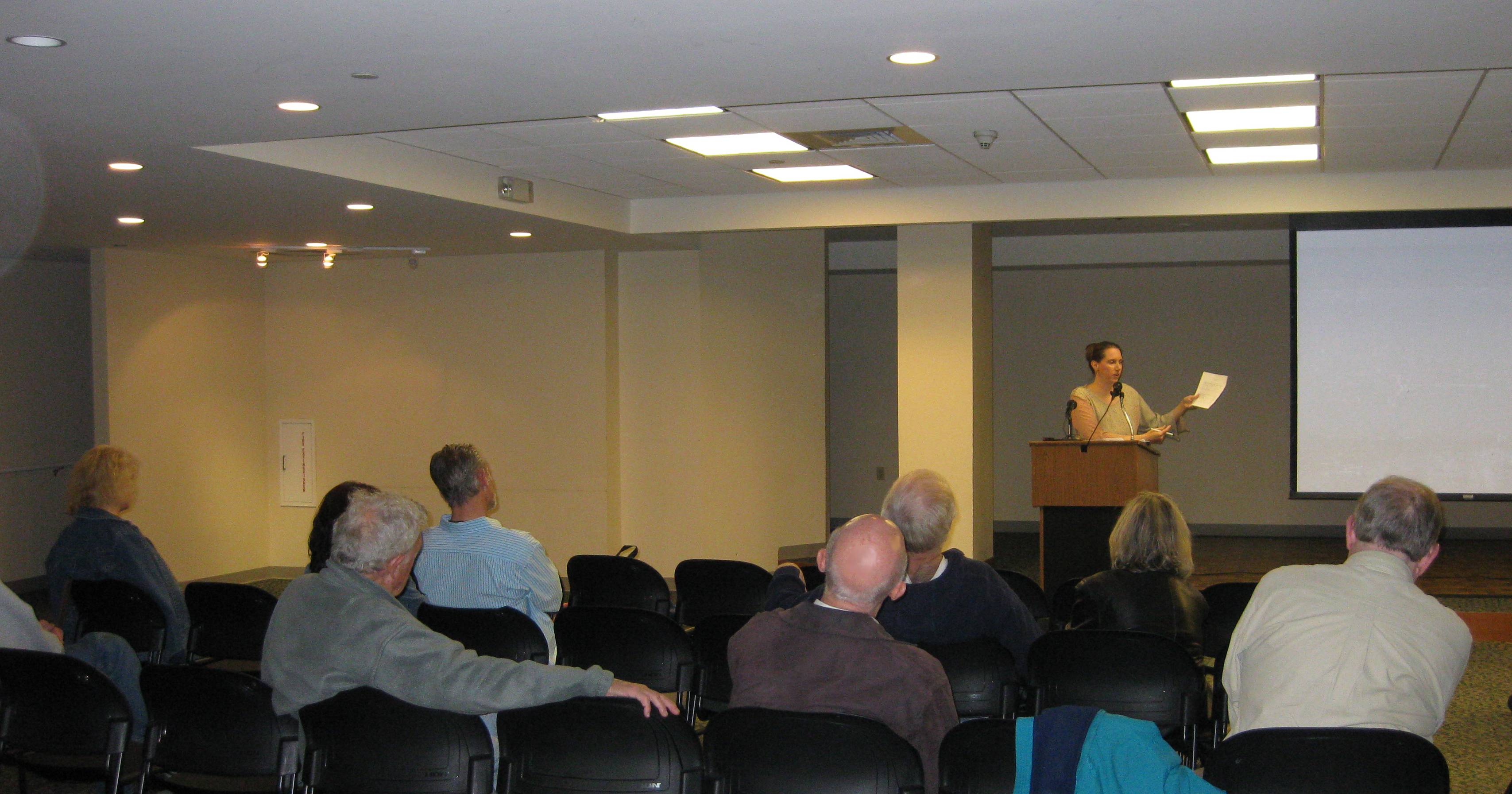
Report back from event participant Kimberly Wilder:
On April 23, 2009, the Huntington Chapter of the LIPC held a debate on the topic: “Do we need a national third party?”
David Sprintzen of LIPC spoke against the usefulness of a national third party. His comments included thoughts about how third parties can work better at the local level, third parties as pressure groups (ie: cross-endorse only) for major parties, and using a variety of tactics to change the culture and steer the ship of state. He noted that national third parties in recent times have proved “insignificant.”
I was the speaker for the argument: “Yes, we do need a national third party.” My arguments included the idea that when decisions are made, we need someone else in the room besides leaders from the Democrat Party and Republican Party. Also, that our country has benefited from third parties such as the Abolitionist Party and the Woman’s Suffrage Party. My comments were sprinkled with quotes from ballot access expert Richard Winger, and third party hero Ralph Nader.
As expected, after the formal program, I was put in the position of arguing with an enrolled Democrat who still believes that Ralph Nader running in 2000 made Al Gore lose, despite all the clear evidence to the contrary. (I do have to correct, that I stated in our informal conversation afterward that the DNC had admitted that Nader did not cost Gore the election in Florida, but I realize it was the DLC I was recalling.) The gentleman I was arguing with did not take stock in the fact that the newspaper consortium’s independent finding was that Gore actually won Florida.
The Huntington event opened with a showing of video from the recently convened “Left Forum” in New York City. Public Access producer, and Huntington Chapter LIPC member, Terry Morrone screened his video from the event. It showed a presentation by Vivek Chibber, “American Militarism and the US Political Establishment: The Real Lessons of the Invasion of Iraq” Chibber explains US war policy through several US administrations, mentions the Clinton administration policies of hostility against Iraq, and some thoughts on 9-11.
Below are some photos from the third party debate event. And, at the very bottom, a revised and reformatted copy of my comments.
–
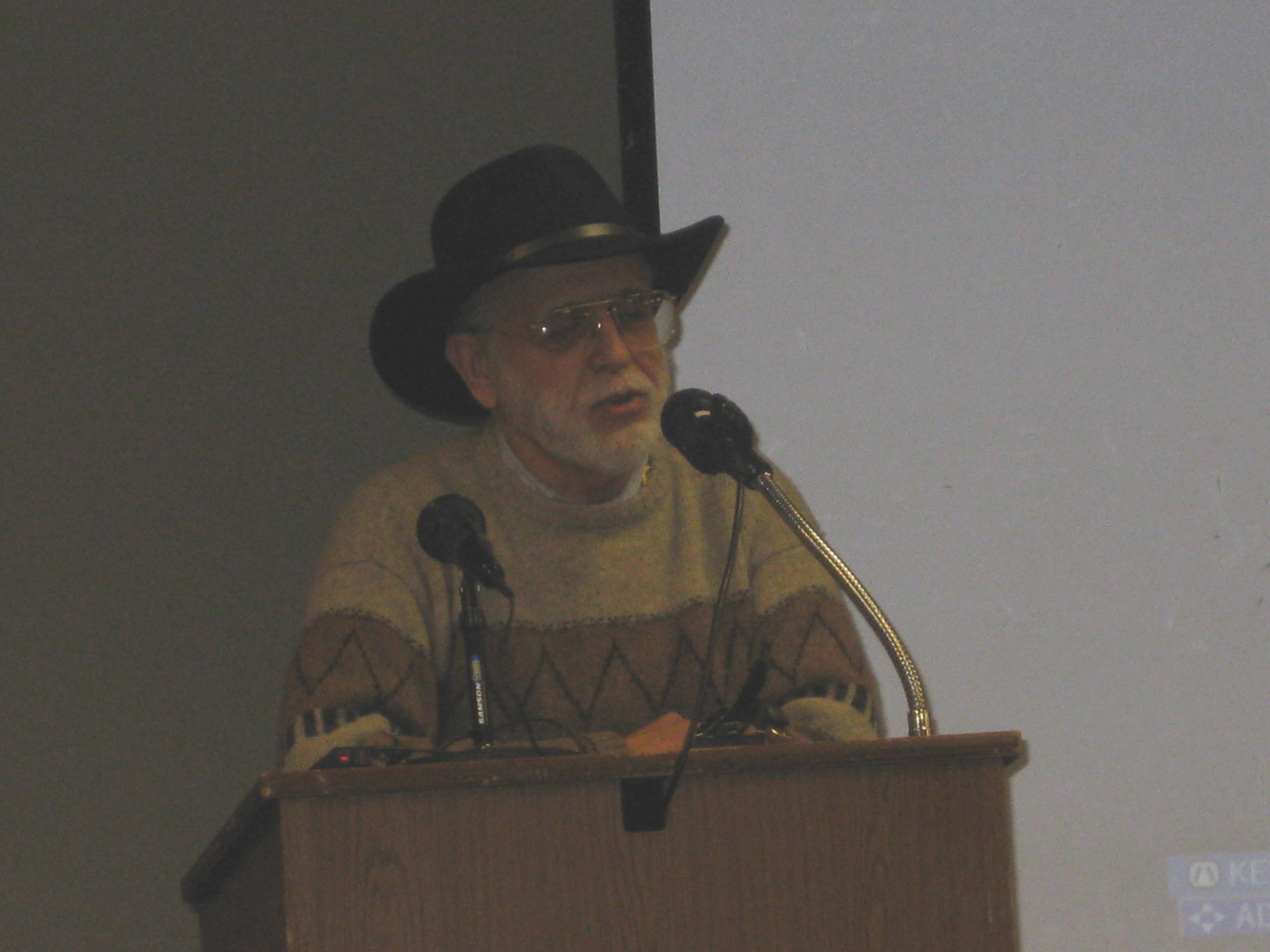
David Sprintzen of LIPC
–
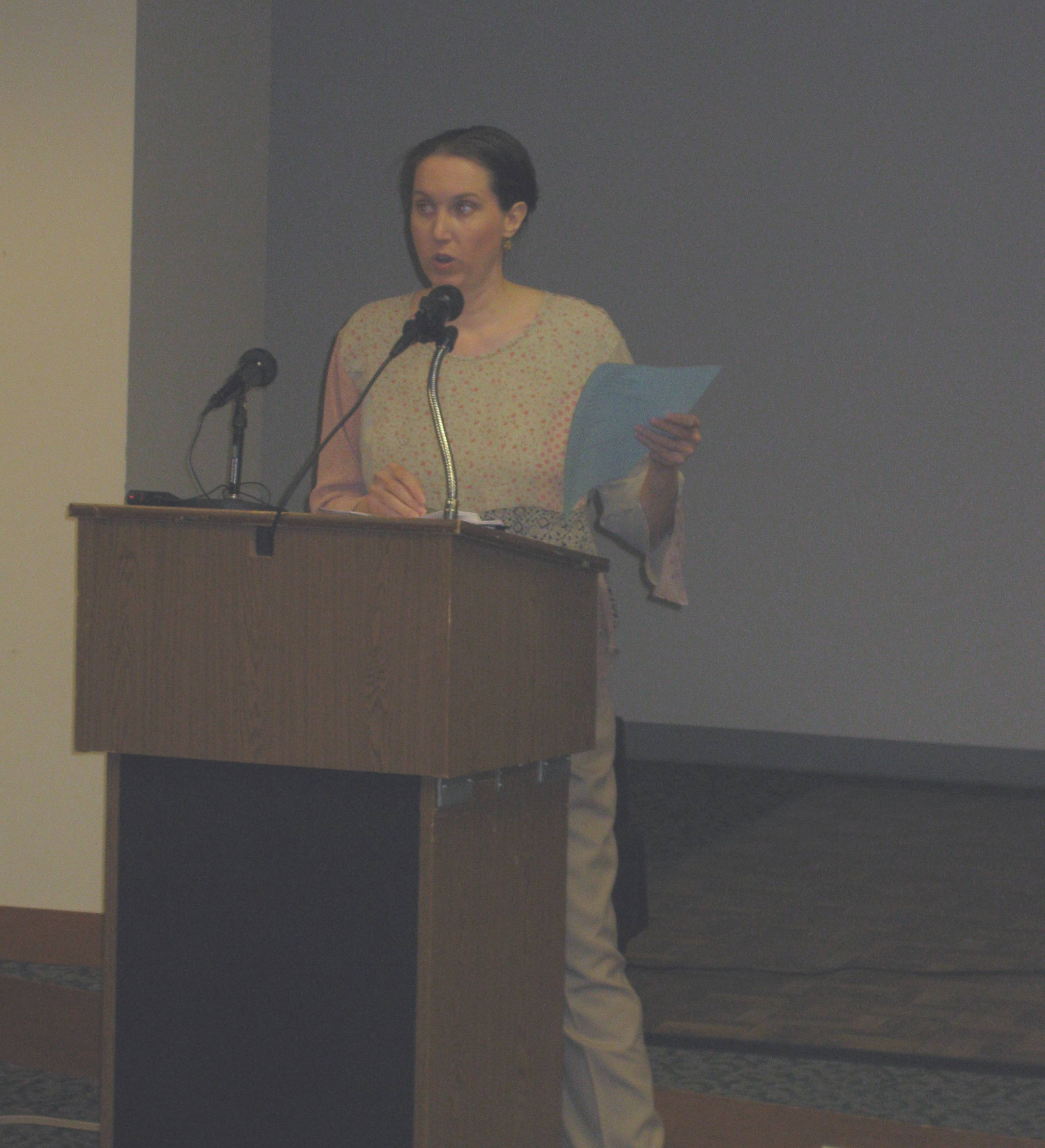
Kimberly Wilder "Yes, we need a national third party"
–
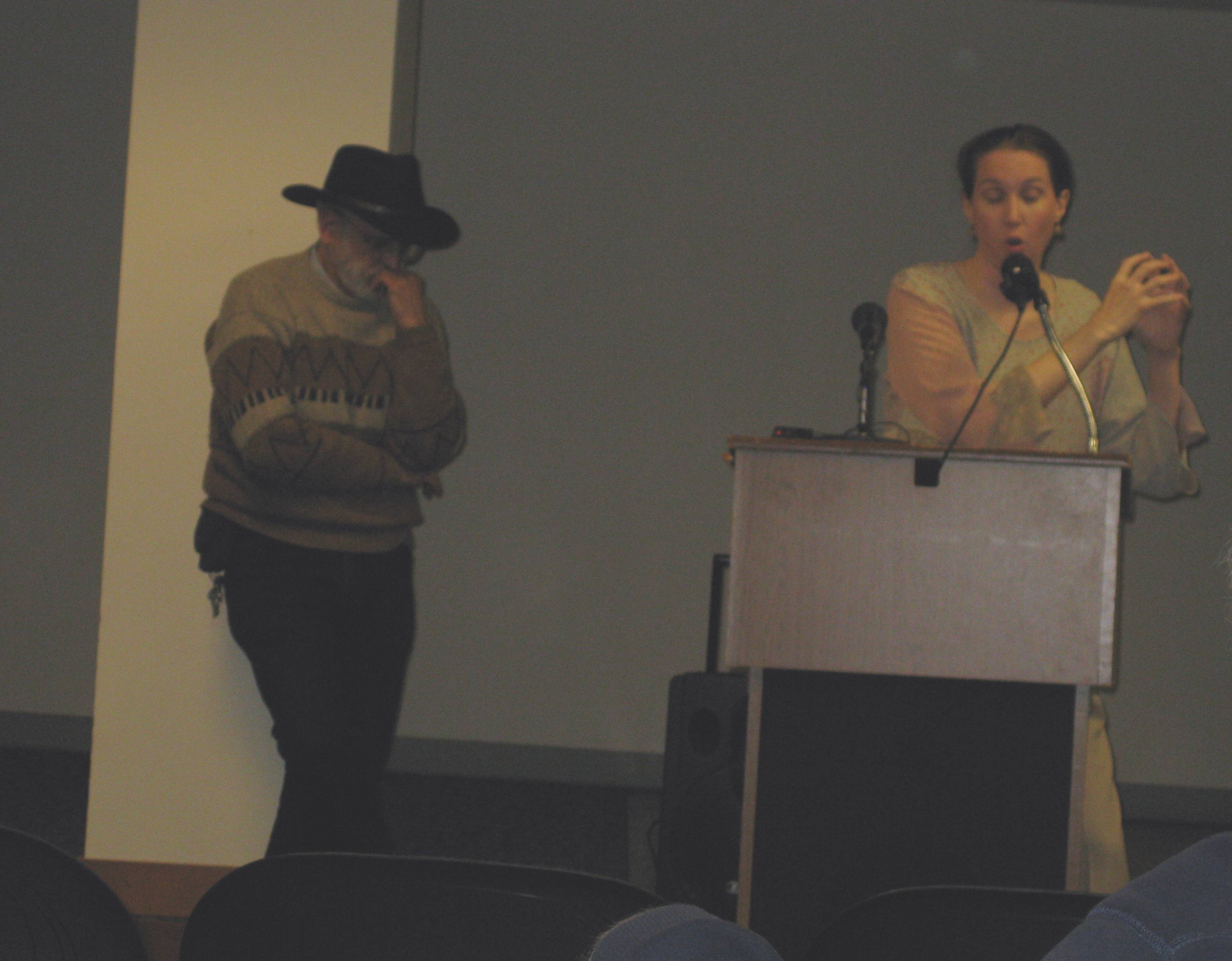
–
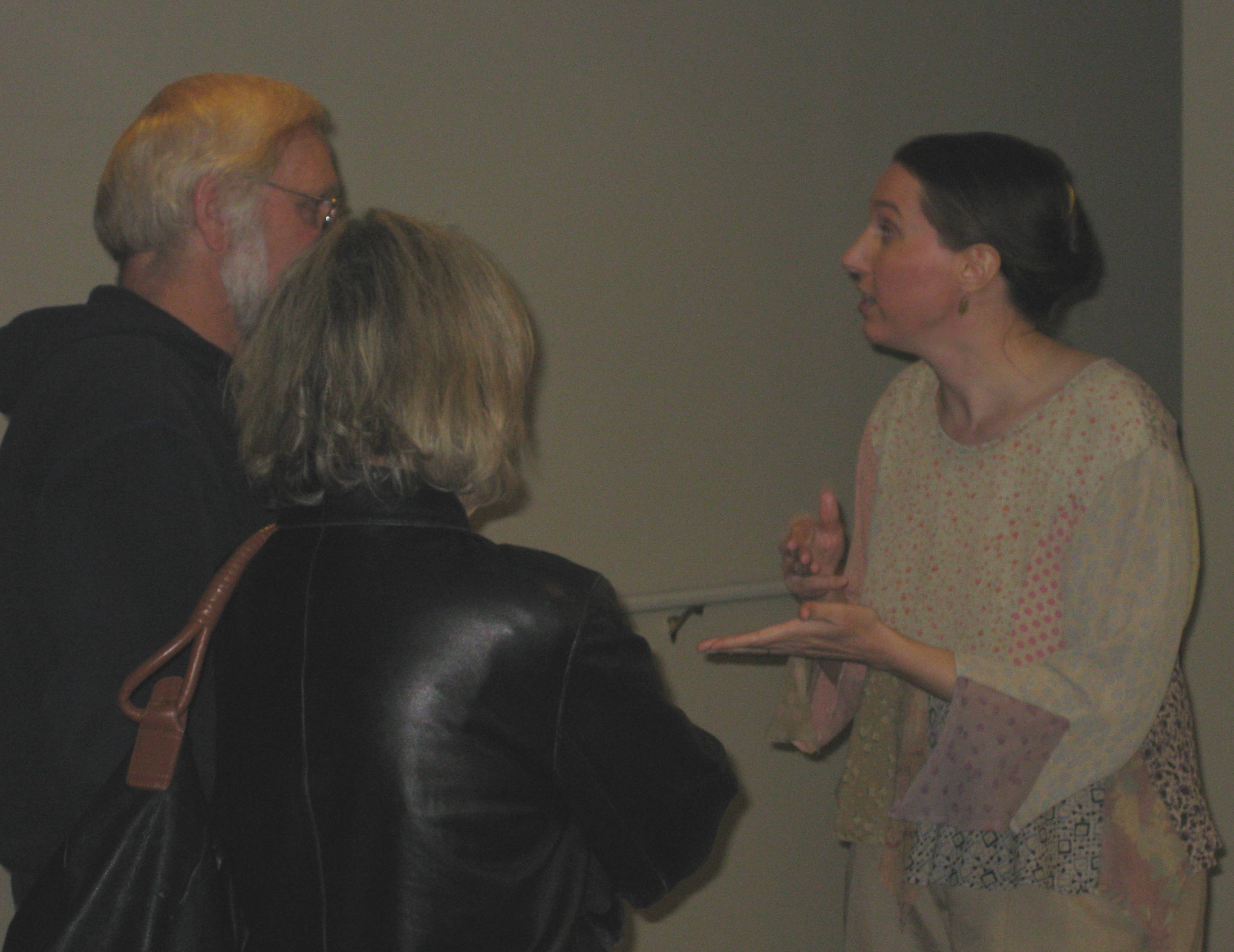
Kimberly tries to explain to an enrolled Dem that Nader did not spoil 2000
–
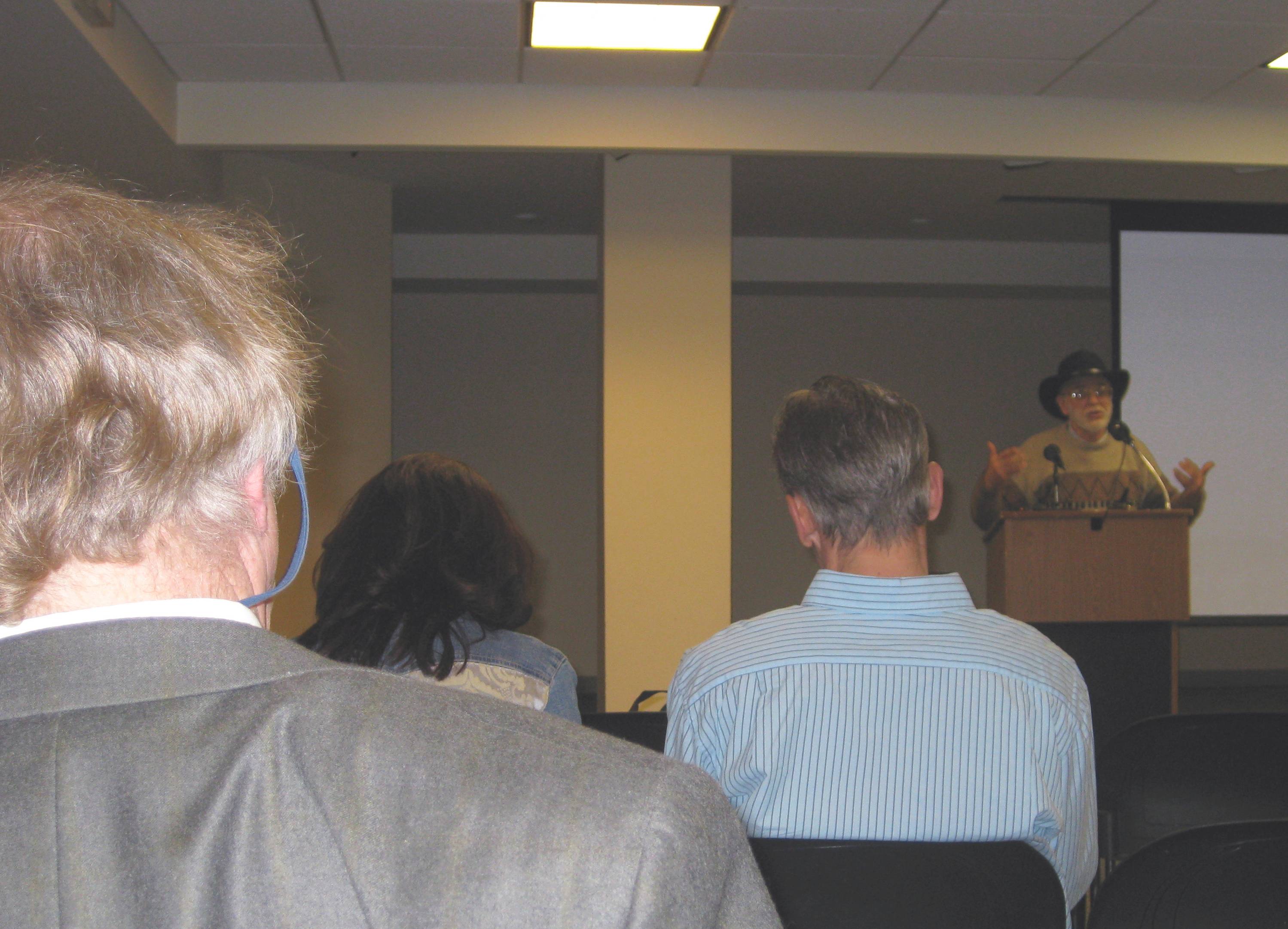
–
Why We Need a National Third Party
by Kimberly Wilder
In a tribute to the thinking of David Letterman…
Top Ten Reasons to encourage, support (and, of course, allow) national parties other than the Democratic Party and the Republican Party:
10. If the rule is only two parties, what if someone wants to go back to the Whigs and the Republicans? Who gets to pick which two parties?
9. If America can have more than one religion, why can’t we tolerate more than one party? (And, how can you deny someone -either by law or social pressure-the right to assemble with like minds in a way they think will be effective?)*
8.If the only two choices are Democrats and Republicans, what happens when those two parties agree, and find themselves behind closed doors? (Who watches? Why would they do the right thing?) Think about the Democrat and Republican chairpeople you know? Would you trust them to be in control of the whole playing field?
7.If the only choice in 2012 is Democrat Barack Obama or a Republican, how will there be any political movement between now and 2012 to make our country move to the left? Who will provide pressure for Obama to promote peace/non-violence? The way parties work, there will almost definitely NOT be a challenger in the primary. But, even if there is, and that is the place for left/peace pressure, then it only happens in the Democratic Primary, only Democrats can participate (which leaves out masses of peace people)? And, how can those Democrats think they can make a stand for peace at the convention, when we have seen that the Democrat Party is able to stop the wearing of a simple peace ribbon inside their convention hall? (Think about the Free Speech Zones with barbed wire that the Democratic National Committee set up outside their convention halls.)
7A. Related: Spiral versus see-saw.
In college, I was taught that the culture (art, philosophy, etc.) swings back from Romantic to Classical back and forth, back and forth, like a pendulum, but learning things each time so that it becomes a spiral of progress. What happens if it is only a pendulum? If you only have to choices?…Democrat – Republican, Republican – Democrat. Left to Right, Right to Left. How does progress happen? How do we ever get a bigger shift to left and justice? Or, to something better or different?
6. If your sister, friend, political hero, or co-worker wants to run for President under the banner of their third party of choice: Would it be your duty to stop them? Would it be your choice to stop them? How would you feel about people who criticized and blamed them? How would you feel about unfair laws and petitioning rules that blocked them?
5. If you want to run for President, and you have an issue or party name you want to stand on, who do you think has a right to: discourage you from doing it? attack you for trying to run? or block you legally from trying to run?
Now, we are up to number four of…Top Ten Reasons to encourage, support (and, of course, allow) national parties other than the Democratic Party and the Republican Party to exist…
4. It takes courage for little people to stand up with other little people against those who have entrenched power.
3. Third Parties are a way of creating smaller organizations, where new people, people of diversity, and people without huge amounts of wealth or family connections have a chance to practice leadership and give input into a national platform. Who do you know that is a Democratic delegate to the Presidential Convention? On the Democratic National Committee? Could you, yourself, ever hope to be? Within a few years of me being in the Green Party, I was able to be a Presidential Delegate. And, later a National Delegate. I do not believe that someone like me would have had the ability to participate on that level if I tried to participate (and had to compete) in the major party structure.
2. National third parties work in other countries. Ballot Access expert Richard Winger notes: In other countries, such as Canada and England, they have completely neutral election laws, a field of national third parties, and a very healthy political process and discourse… “Their laws do not discriminate in favor of any parties, or against any parties. Ballot access in those two countries is exactly the same for every party, big or little, old or new.”
1. National third parties have, in the past, worked and been good for our country. Third parties have motivated, supported, and leant power to some of the greatest social justice movements in America. Some examples: the Liberty Party, the Anti-slavery Party, the Women’s Right to Vote Party (also called the Woman’s Suffrage Party), the Labor Party, the Populist Party, the Farmer Party. What if everyone blocked and/or mocked those parties?
In closing, I would like to present a quotation about the importance of third parties. After I read it, I will tell you who said it:
“Historically, the great ideas that have animated social justice and driven it to some sort of success in our country, have all come from 3rd parties. And, aren’t we glad that ballot access barriers were much lower in the 19th century than they are today, much less obstructive?
Because, that allowed the Liberty Party, the Anti-slavery Party, the Women’s Right to Vote Party, the Labor Party, the Populist Party, the Farmer Party to get on the ballot.
And, aren’t we glad that there were some voters in the 19th century who didn’t say, “Well, we’re going to vote for the least-worst on the issue of slavery between the Whig Party and the Democratic Party.”? Who, instead voted for the small party that led the fight electorally, speaking out against slavery?
Aren’t we glad there were some voters who didn’t try to figure out who was the least-worst on the women’s right to vote between the Democrats and the Republicans? And, supported the women’s right to vote through the Woman Suffrage Party?
Well, if we like that, then we should like it in the 21st century, as well.”
The quotation is by former third party and independent candidate Ralph Nader.
-end
_____________________________________________________________________________
* The argument comparing freedom to form third parties versus freedom to choose religions was presented to me by ballot access expert Richard Winger.
Filed under: News Tagged: | David Sprintzen, kimberly wilder, third parties, third party


 .
.




The David Letterman top ten list counts down from ten to one I think.
Oh, you are soooo right.
I think I will have to fix that!
Thank you.
;)
David accused 3rd parties as being “irrelevant” , not “insignificant”. Perhaps he meant insignificant, but he used the word irrelevant numerous times. The difference is that one would mean of little value, the other not applicable at all, or no value. It is my belief that he thinks they are of no value to the progressive movement. He was mostly referring to national politics with this regard. And yet, “irrelevant” Green party cost the Dems an election in 2000(according to David). He actually went as far as saying that Nader “intentionally” went out of his way in Fla. to cost Gore the election…….So, which is it? Are we irrelevant, or did we impact a presidential election?
Control of the media in this country(and others)is why 3rd parties are irrelevant, or insignificant. If we the people actually had any authority over “our” broadcasting, we might see a different climate in politics. We know that, and the evil ones know that too.
Thanks John. And a million thanks for coming to the event.
I can’t wait to review the tape to see what he really said. I am wondering if he ever did say “insignificant”, or if it was always “irrelevant.” I think I will wait to change my report until I know the answer.
Thanks for your take on things.
Peace,
Kimberly
Hi,
Just a word or two about this word… “irrelevant” The Third Party is either relevant or not relevant. Irrelevant is not a proper word and the Third Party is relevant.
Thanks,
Philip M. Edwards
(pmespeak.com)
LOL!
Well…if I say it with a smile on my face, might I tell you that your comment is irrelevant?
;)
I am a poet, and I claim poetic license. I like any word that conveys its meaning.
(Thanks for supporting third parties!)
Peace,
Kimberly Wilder
Kimberley
From your buddy in Minnesota.
Thank you and good job.
Many thanks. Glad you approve.
;)
Kimberly